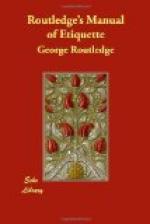When we hear persons loudly declaiming against dress as a needless waste of time and money—when we hear them sighing for the return of the good old times when it was not so much considered, we are tempted to inquire at what period in the history of the world those times occurred; for we cannot learn that it was, at any time, considered to be an unimportant item of expenditure or thought. We do not by any means affirm that it may not occupy too much care; that there may not be instances in which it is suffered to engross the mind to the detriment of other things more worthy of consideration; that it may not lead to frivolity and extravagance. All this may be, and no doubt often is, true. It is quite possible, and more than probable. But we also maintain that it is a great mistake to come down upon it with a sweeping denunciation, and, in Quaker fashion, avow it to be all vanity, and assert that it must be trodden out of thought and eye. Even the Quakers themselves, who affect such supercilious contempt for dress, are very particular about the cut of their headgear, about the shade of their greys and their drabs and their browns, and, in their scrupulous neatness, show that they think as much of a grease-spot or a stain as many a damsel does of the ribbon in her cap or the set of her collar and cuffs. So that, after all, whatever professions people may make, human nature and human wants are always the same.
It by no means follows that a person who is well dressed thinks a great deal about it, or devotes much time to it. To some persons it comes quite naturally. They look well in whatever they wear; and the probability is that it occupies less of their time and thoughts than many who arrive, with infinite more labour and pains, at a less pleasing result.
In submitting this manual to the public, we do not presume to do more than offer such suggestions as may promote a better style of dress, consistent with a due regard to economy. No doubt many of our suggestions will have occurred to some of our readers, and it may seem almost needless to have made them, but we know by experience in other things that maxims are often forgotten and laid aside till something occurs to revive them.
It is easy enough for the rich to be in harmony with the prevailing fashion. They have but to open their purse-strings, and pay for any of those freaks of fancy which are called fashion. To combine a good style with economy requires judgment and contrivance, or, what is generally called, management.
There are certain points which may be considered as fundamental, without which the most rigid attention to matters of dress will go for nothing. For instance, cleanliness, which according to the old proverb, is rated so high as to be placed next to godliness, is one of these, and of primary importance. The most costly attire, if unaccompanied by it, is not only valueless, but may become a positive disfigurement, while the simplest dress, combined with cleanliness, may be absolutely refreshing. There is no reason whatever why the most menial occupation should be admitted as any excuse for want of personal cleanliness. It is always easy to distinguish between accidental dirt which cannot always be avoided, and that which is habitual.




